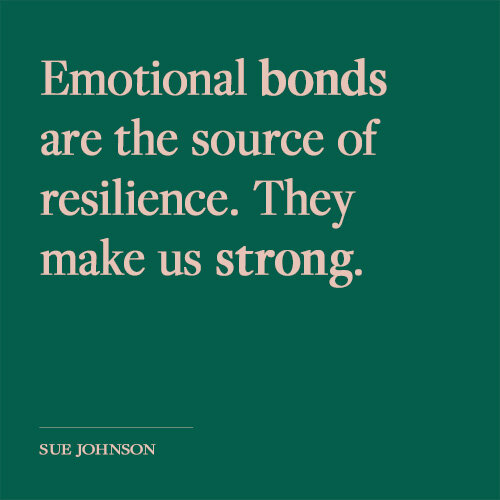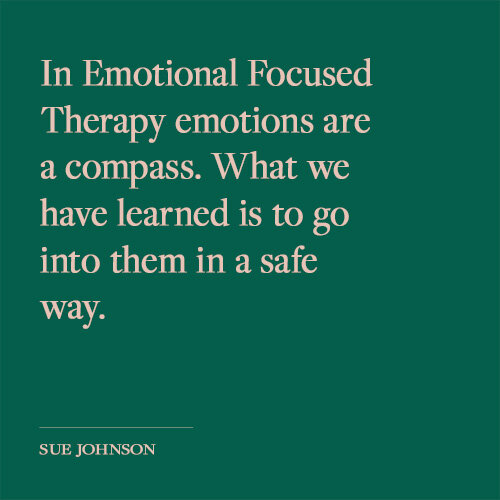“We change relationships by changing the emotional music”: An interview with Sue Johnson
How can we deal with emotions? Why is it so difficult to be vulnerable? Why do couples get caught in destructive dynamics: countless fighting, stone walling for days, divorce? And what does it mean to be resilient?
Share or pin this interview with EFT-therapist Sue Johnson
In this interview Sue Johnson talks about her experiences as a couple therapist and researcher. If you aren’t familiar with her name. Let me tell you that she is one of the most extraordinary and important figures in couple therapy of our time. Since the 1980s she consulted thousands of couples and conducted profound research. Her findings are the core of Emotional Focused Therapy (EFT). EFT is a form of therapy that is embracing emotion instead of condemning it. Her theory is not quite new, and yet not well established in Germany. Studies show that EFT is now roughly 75 percent effective, according to the American Psychological Association – therefore it is one of the most effective form of couple therapy. But to get to this point, a lot of change, transformation and shifting of perspectives was needed.
If you are a couple, I warmly recommend you read Sue’s book “Hold me tight” or even find a workshop close to you. And if you are a therapist, have a look at the full interview and get her book Attachment Theory in Practice. For my work, it’s gold!
Hello Sue, you're dealing with challenges with a unique curiosity. Where did you get that from?
Sue Johnson: I am and was always very curious about emotions, and how they work. From my childhood on to my studies, I wanted to know people’s stories and how people's lives unfold, how they understand their lives and how they create relationships. I remember, when I first started working with couples, there was no guidance in the literature or in the research. Especially all these emotions were overwhelming. I wondered how a distressed couple could move so differently from what I saw, when they came in 12 weeks ago, to what I see now. When I analyzed the sessions, I became fascinated by the patterns in the drama and the process of ordering.
Therapy reminded me of Argentine tango. Argentine tango is like the chess of social dancing. It is very difficult and yet strangers can move with this incredible synchrony together. It’s the same with couple therapy. Now I could see the beautiful music that is playing.
How did you overcome adversity and how do we build resilience?
Sue Johnson: People are resilient, if they have at least one relationship or hopefully more, where they feel worthy and special. They need to get the message, that they are competent, and that they are strong enough to take life on. I got that somewhat from my grandmother, but mostly from my father. My resilience comes from that sense of secure attachment. Secure attachment is what we try to create in our couples in couples therapy. We don't just want couples to be able to negotiate better, this is the booby prize.
We want to build emotional bonds. We know that these emotional bonds are the source of resilience. They make us strong. We're social bonding mammals. Love is not just a sentimentality, or a myth, or for adults some sort of mixture of sexuality and sentimentality. It is an ancient wired-in survival code, that is designed to keep a few people, you totally trust and you depend on, close to you.
When we don't have this connection, we start to fall apart. Our nervous system goes into alarm. Our brain doesn't put our world together in a coherent way. We're filled with alarm and vigilance for danger. We are like fish in the ocean, and the ocean we swim in are our close relationships. If you take a fish out of the ocean, or if you have an ocean that has no oxygen in it - no safety in it - then the fish start to look very strange indeed.
If we understand empathy is wired into us as human beings, the question is what blocks it? What blocks it mostly is fear. What blocks it is overwhelming emotions. If I'm having a tsunami of overwhelming emotions inside me, I don't even have the energy to look into your face, and tune into what you're feeling. I'm fighting for my life inside my chest here. And it sounds so corny. But attachment was analyzed and researched. And Emotional Focused Therapy is based on attachment theory.
Can you say something about your research and attachment theory?
Sue Johnson: Attachment science has changed how we see children, how we see children’s' needs, how we respond to children. At least in many areas of the world, we don't treat children the same way as we did 20, 30 years ago. We don't drop them off at the hospital to have an operation and go back pick them up a week later. If you say that to parents now, they would say: "Oh, that would traumatize the child." People forget until the beginning of the 70s, that was actually the norm in many parts of North America.
Only around the beginning of this century, attachment theory was applied to adults. Before we were in love with the idea that adults were somehow self-sufficient grownups. We never grow up to the point, where we don't need other people.
Science is gold, it is the holy grail for us in psychology. And there is research from my wonderful social-psychological colleagues, and now from neuroscientists as well on. For example, I did a brain scan study with a man called Jim Coan from the University of Virginia. He is a neuroscientist, who puts people in brain scan machines, and looks at what happens to them.
We found, that when we help people have bonding conversations, before they were threatened with electric shock, while their partner held their hand, it completely changed how their brain responded to the threat of
shock, and to the shock itself. It changed the pain level, it changed the threat. Their brain just stayed in a resting state. When they were distressed, and couldn't have the bonding conversations, holding their partners' hand didn't make any difference to how awful their brain responded to the shock.
So neuroscientists started to look at attachment, social-psychologists started to look at attachment, and gradually now, clinicians. The findings are in my book, that came out last year “Attachment Theory in Practice”. This science has the ability to bring the field of mental health together, to bring psychotherapy together, to give us a map to people's most basic needs and basic fears.
Why does Emotional Focused Therapy work so well?
Sue Johnson: John Bowlby, who is the father of attachment theory, said. “At the heart of every mental health problem or adjustment problem, there are frightening, alien and unacceptable emotions.” These emotions take us over, and that is why we're scared of emotion. Indeed, they can take us over. They are supposed to take us over, and orientate us. Particularly, emotions like fear, sadness, shame. If you want people to change and grow, you have to go there with them. You don't stand outside and give them advice. You have to go into the emotion with them, and help them accept their pain, make it less frightening. Help them see it as normal, and natural, not alien. Help them see it as acceptable. And then they find new ways of putting that pain together and growing.
EFT works because it is on target. We know how to focus. We know how to go down into the heart of the matter. We know how to help people with these huge emotional dramas, that define who they are and take over their life. One lady said to me recently: "Nothing has changed on one level, but everything has changed. I get that my whole life - even from the time I was very small, and now I'm 60 years old – has been an incredible fight. A fight between longing for closeness, feeling empty, alone and deprived of love, and being terrified of closeness. I feel that the only closeness I have known resulted in someone taking me over, me being powerless, me being hurt all the time. I've just bounced between those two things my whole life." And now that she can make sense of her emotions, she finds a way to navigate.
What do you mean by making sense of emotions?
Sue Johnson: For many models of therapy, it seems to me that emotions are framed as the enemy. They are something you have to control, you have to meditate away, you have to create coping mechanisms. Of course, you do have to regulate your emotions.
But for us in Emotional Focused Therapy emotions are a compass. What we have learned is to go into them in a safe way. The regulation is something, that happens organically. It is not something, that you create only by breathing. We work with emotion. It is called Emotionally Focused Therapy. We see emotion as our friend. We go into it. We trust it. We see it as a process. Emotion colors everything. Emotion colors your world and tells you what matters, helps you create meanings, creates expectations. It is also the way you communicate with other human beings. It is the music of the dance with other human beings. Emotions define the dance with other human beings. The emotional music you're playing in a relationship defines the dance. We change relationships by changing the emotional music.
Why do you think are people afraid of connection, if that is what we all are longing for?
Sue Johnson: Because we're very vulnerable, and because of our need to belong and to be seen. We are scared, that we will be rejected, we will be abandoned. That we will call and no one will come. That we will feel this aloneness. Aloneness is the most devastating pain of all – and it’s the one, that our nervous systems absolutely cannot deal with.
Being vulnerable is a threat. We know and experienced, that other people’s rejection and abandonment can hurt us more than anything else in the world. To open up and let yourself long for love is a risk. That is for me the ultimate human dilemma. Risk and you could be hurt, rejected, and abandoned. Don't risk, and you're alone forever.
How can EFT help us to take that risk?
Sue Johnson: Couples in couples therapy have shown us how to reach out and to have what we call a "Hold Me Tight" conversation. We've taken the "Hold Me Tight" program based on the book and it is online now.
First is to recognize how we dance together in a way, that freaks each other out and leaves each other alone. Doing this we are able to recognize, how vulnerable we are, and what we long for, and there is nothing wrong with that longing. It doesn't mean, we're weak. It just means we're human. What we do in couples therapy is to help people accept those longings and fears and to find ways to ask for what they need in a way that pulls the other person close.
What defines love relationships is emotional accessibility and responsiveness: A.R.E. "Are you emotionally accessible, responsive and engaged?" The process of opening up, sharing vulnerability, responding to vulnerability, holding each other, creates a positive, loving relationship, and grows people. They say: "Love grows people". But it’s not infatuation or some sort of weird Hollywood love. Bounding conversations grow people.
This also applies to sex. Sex could be many things. It is a commodity now in our society. Sex can be recreation. But in most people's lives the essence of sex is, that it is a bonding activity. Do we teach people about that? No, of course we don't. Sex education is a joke. We just teach people about how the body works during the sex act. That is like teaching tango, and just teaching the first four steps.
If we're going to survive as a species, and certainly, if we're going to build any kind of civilized world, we have to know who we are. Are we predators? Are we just for ourselves? Is man selfish, predatory, aggressive, competitive? Is unbridled capitalism the way to go, because that is who we are? Is sex about getting the best orgasm, and finding the person who can give you the best orgasm? So, is it really a person as an instrument to an orgasm? Is that who we are? We can be those things.
But no. In essence that is not who we are. We're bonding human beings. We're stronger, and healthier, and more complete in safe societies within bonded relationships.
Thank you a lot, Sue!
My name is Dr. Sharon Brehm and I offer systemic couple therapy and EFT couple therapy in Munich. My office for single and couple therapy is right in the center of Munich.
On my blog you will find all interessting thoughts about love and relationships: From interviews with other couple therapists, to information about emotions and relationship advice. Right now, I’m translating my articles step by step - if you are impatient, check the German version and have a look there :)
If you want to get to know me more, you can find me also on Instagram! If you prefer videos: I also have a few YouTube videos on my channel (though in German, but maybe this is the time to work on your language skills too ;) . You’d help me a lot, if you subscribe to it!
Photo credit: Diego Rezende via unsplash









